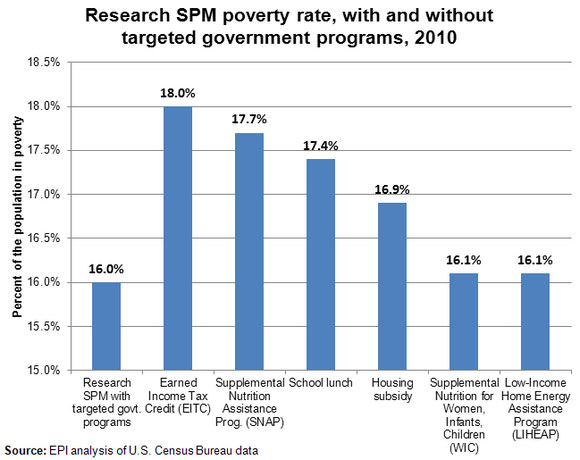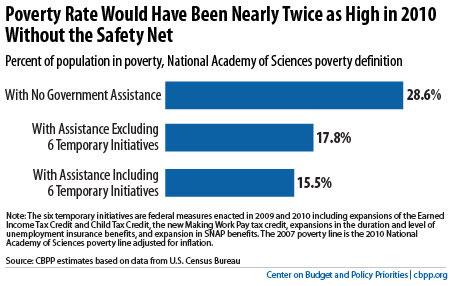This fall, as eye-popping statistics depicting the obscene wealth of the top 1 percent were liberated from obscurity by Occupy Wall Street, some equally revealing figures emerged showing how those on the lowest rungs of our economy are faring. The vicious bite of the Great Recession has left one in three Americans—100 million people—either poor or perilously close to it, one busted car or broken leg away from falling into the vortex of dire need whose gravitational pull is a constant feature of their lives. These figures—drawn from the government’s new Supplemental Poverty Measure, or SPM—provided proof of something these Americans already knew: that the social safety net—the anti-poverty programs that form the legacy of the New Deal and the Great Society—remains, even in its stretched and frayed condition, their last, best defense against what FDR called “the hazards and vicissitudes of life.”
The official definition of poverty—developed as a temporary measure by a research analyst at the Social Security Administration named Mollie Orshansky, and formally adopted in 1969—has little relevance to how deprivation is experienced today. With the SPM, it’s possible to glimpse the many forces dragging people down—such as the price of childcare or the high cost of housing in some areas—as well as the mitigating effects of government relief [see chart below]. The portrait it provides of the Great Recession is illuminating. As the damage from the financial meltdown began to spread throughout the economy, triggering waves of layoffs and foreclosures, the parts of the safety net still designed to respond to need, such as food stamps and unemployment insurance, did what they are meant to do. Between 2007 and 2010, these programs kept 10.8 percent of the population out of poverty, according to an analysis by the Center on Budget and Policy Priorities (CBPP).

But perhaps the most striking takeaway from the new data is that President Obama’s 2009 American Recovery and Reinvestment Act—yes, the much-maligned stimulus package—made a tremendous difference in the lives of millions. Without the Recovery Act, which included expansions of the Earned Income Tax Credit (EITC) and the food stamp program, the poverty rate would have increased from 14.9 percent to 17.8 percent between 2007 and 2010, and 9.9 million more people would have become poor. Food stamps alone kept 4 million Americans from plunging into poverty in 2010; as for the EITC, the number is 6 million. Without the safety net as a whole—including the pre-existing social welfare programs and the Recovery Act initiatives—the poverty rate in 2010 would have been a staggering 28.6 percent, nearly twice the horrifying 15.1 percent it did reach [see chart below]. “It’s awfully hard to think of a single piece of legislation since the 1935 Social Security Act that has done more to keep people above the poverty line than the 2009 Recovery Act,” says CBPP senior researcher Arloc Sherman.

And yet, Americans who find themselves mired in the bottom third of the economy, hovering at up to 50 percent above the poverty line—whose collective wealth, it has been noted, is equivalent to that of six members of the Walton family on the Forbes 400—are feeling these very emergency supports slip away. Republicans in Congress are not only obstructing an extension in federal unemployment benefits, at a time when 5.7 million people have been out of work six months or more; they are quietly killing the range of safety net initiatives in the Recovery Act that have kept millions from poverty. The result is an unfolding catastrophe that is receiving almost no attention from the media or political establishment.
According to the CBPP, $11.3 billion in food stamps funding will phase down until it disappears in 2013. The Making Work Pay Tax Credit, which provided more than $50 billion in 2010, expired in 2011, impoverishing an estimated 400,000 households. An array of other tax credits aimed at low- and middle-income households, amounting to $15 billion in 2010, will end in 2012. “If Congress fails to extend the tax credits, it will send a lot of people back into poverty,” says Melissa Boteach, manager of the anti-poverty campaign Half in Ten for the Center for American Progress. At the same time, states whose budget crises born of the Great Recession were temporarily eased by the Recovery Act are losing that cushion, and many of them are passing on the pain to the poor. Ten states have cut unemployment benefits; numerous others are paring back childcare and work-related assistance; Medicaid is facing deep cuts; and help for the neediest families under TANF (which replaced welfare in 1996) has been sharply reduced, by 20 percent in South Carolina, for example—leaving benefits for a family of three at a mere $216 per month, bringing them to just 14 percent of the poverty line. (For more on the hardship imposed by Clinton-Gingrich welfare reform, see Diana Spatz’s article.)
Drumming up outrage about the expiration of a bunch of technical-sounding tax credits and state budget fixes is not easy. It’s tougher because President Obama has done so little to own what is arguably the biggest progressive accomplishment of his presidency, the Recovery Act. While there may be disagreement about the reasons for this failure, there’s no doubt about its effect: emboldening the Republicans in their relentless, decades-long, billionaire-backed assault on the Great Society, which has succeeded in moving the policy and rhetorical frame far to the right. Having embraced House Budget Committee chair Paul Ryan’s plan to eviscerate programs for the poor, the sick and the elderly last spring, the GOP now has as its front-runner a 2012 presidential candidate who proposes child labor as a solution to child poverty. Clearly, a safety net caught between the contesting forces in today’s Washington will not survive intact. As Lizzy Ratner notes in this issue, “Obama does seem to have some kind of social contract vision, but it is based largely on compromise, on the social contract as process, not values. This is all well and good until you’re forced to go up against a pack of social Darwinists who have no values or belief in process.” This dynamic was manifest in last summer’s debt ceiling deal, which has already led to cuts in the 2012 budget nearly unfathomable to people who work in fields like low-income housing (gone: $3.8 billion), to be followed by even deeper gashes as a result of the supercommittee failure.
All this is enough to induce a combination of trepidation and despair, not exactly prime ingredients for the huge, fearless protest movement that must take shape if disaster is to be averted. Here is where the movement to end poverty could gain inspiration from the proudly unprofessional activists who have seized spaces and occupied the national discourse these past few months. Historically, like OWS, successful poor people’s movements have preferred justice to charity, pursuing goals set not by policy shops but by the people who know most intimately what kind of change they need, and on whose vigorous participation the movement depends. When Lyndon Johnson signed the Economic Opportunity Act in 1964 as part of his War on Poverty, it contained a provision calling for “maximum feasible participation” of the poor—a provision that “grew out of the mass civil rights mobilizations in the 1950s and early 1960s that, with blood and sacrifice, had won basic political rights for African Americans across the South,” writes historian Annelise Orleck in her introduction to The War on Poverty: A New Grassroots History, 1964–1980. The law secured funding for more than 1,000 community action agencies across the country, which helped engage and politicize poor mothers, who fought many battles over the ensuing decade for better food, schools and healthcare for their families (and won some of them). Imagine that: a president signing a law that asked for, even paid for, grassroots participation to shape policies and decide priorities. It sounds utopian now—even under a president who once worked as a community organizer—but as OWS has reminded us, sometimes the size of the demand is the measure of a movement.
Also in This Forum
Betsy Reed: “Occupy the Safety Net” (Introduction)
Lizzy Ratner: “Food Stamps: The Safety Net That Deserves Its Name”
Kate Kahan and George Wentworth: “Unemployment Insurance Under the Knife”
Barbara Ehrenreich and John Ehrenreich: “The Making of the American 99 Percent”
Diana Spatz: “The End of Welfare as I Knew It”
Pedro Noguera: “Tearing the School Safety Net”
Patrick Markee: “The Unfathomable Cuts in Housing Aid”
Sasha Abramsky: “Medicaid in Crisis”
Kai Wright: “Hard Knocks in the Bronx”
Frances Fox Piven: “A Proud, Angry Poor”


